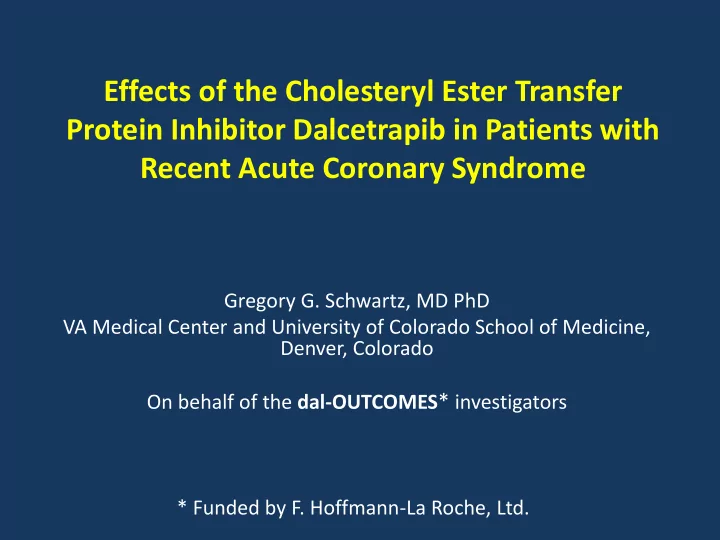

Effects of the Cholesteryl Ester Transfer Protein Inhibitor Dalcetrapib in Patients with Recent Acute Coronary Syndrome Gregory G. Schwartz, MD PhD VA Medical Center and University of Colorado School of Medicine, Denver, Colorado On behalf of the dal-OUTCOMES * investigators * Funded by F. Hoffmann-La Roche, Ltd.
Background • In observational analyses, higher levels of HDL-C are associated with lower cardiovascular risk • However, it is uncertain whether raising HDL-C therapeutically reduces cardiovascular risk • Inhibition of cholesteryl ester transfer protein (CETP) raises HDL-C and therefore might reduce cardiovascular risk • Dalcetrapib is a CETP inhibitor that raised HDL-C by approximately 30% in Phase 2 trials, without effect on blood pressure or neurohormones.
Objective of the dal-OUTCOMES trial • To compare the effects of dalcetrapib with placebo, added to evidence-based background therapy, on cardiovascular risk in patients with recent acute coronary syndrome
Entry criteria • Age ≥ 45 years • Acute coronary syndrome • Evidence-based management of LDL-C • No restriction on entry level of HDL-C • Key exclusions: Triglycerides >400 mg/dl; treatment with niacin, fibrates, or bile acid sequestrants.
Study design Double-blind 15871 patients Until 1600 primary endpoint Dalcetrapib 600 mg (N=7938) Single-blind events placebo run-in Two pre- 4-12 weeks Placebo (N=7933) specified interim analyses Identify Randomization patient with 1 : 1 ACS 935 sites in 27 countries
Outcome measures • Primary outcome composite (time to first occurrence): – Coronary heart disease death – Non-fatal MI – Ischemic stroke – Hospitalization for unstable angina (with objective evidence of acute myocardial ischemia) – Cardiac arrest with resuscitation • Secondary outcome measures: – All cause mortality – Coronary revascularization
Flow of patients in the trial • 19,005 entered single blind run-in • 15,871 patients randomized • Withdrawal of consent or loss to follow-up: dalcetrapib 3.9%, placebo 3.3% • At the 2 nd pre-specified interim analysis, including 1135 (71% of projected) primary endpoint events, the DSMB recommended termination of the trial for futility. • At termination, median follow-up 31 mo.
Baseline characteristics (all balanced between treatment groups) Mean age (years) 60 Female 19% Caucasian 88% Region Europe or Israel 50% North America 32% Cardiovascular risk factors Hypertension 68% Metabolic syndrome 63% Diabetes 24% Current smoker 21% Cardiac biomarker-positive qualifying (index) event 87% Time from index event to randomization (days) 61
Concurrent treatments (all balanced between treatment groups) PCI or CABG for index event (before randomization) 91% Statin 97% Aspirin 97% Clopidogrel, ticlopidine or prasugrel 89% Beta blocker 88% ACE inhibitor or ARB 79%
Baseline lipids (mean) (all balanced between treatment groups) mg/dl mmol/L LDL cholesterol 76 1.96 HDL cholesterol 42 1.09 Triglycerides 134 1.51
HDL-C and LDL-C by treatment group HDL cholesterol (mg/dl) Placebo Dalcetrapib LDL cholesterol (mg/dl) Placebo Dalcetrapib Data are mean ± 95% CI
Primary outcome* by treatment group Hazard ratio 1.04 (95% CI 0.93-1.16) * Coronary heart disease death, non-fatal MI, ischemic stroke, hospitalization for unstable angina, resuscitated cardiac arrest
Risk of primary and secondary outcomes Event Dalcetrapib Placebo Hazard Ratio (95% CI) (% at 3 years) (% at 3 years) P-value Primary composite 9.2 9.1 1.04 (0.93-1.16) 0.52 CHD death 1.6 1.8 0.94 (0.73-1.21) 0.66 Non-fatal MI 5.9 6.0 1.02 (0.89-1.17) 0.80 Unstable angina 1.3 1.3 0.91 (0.68-1.22) 0.54 Resuscitated 0.2 0.1 1.41 (0.63-3.18) cardiac arrest 0.40 Ischemic Stroke 1.4 1.0 1.25 (0.92-1.70) 0.16 All cause mortality 3.1 3.4 0.99 (0.82-1.19) 0.90 Coronary 9.5 9.6 1.00 (0.87-1.11) revascularization 0.97
Why did dalcetrapib fail to reduce risk? No association between baseline HDL-C (by quintiles) and risk of primary endpoint
Systolic blood pressure and hs-CRP were slightly higher with dalcetrapib than placebo With dalcetrapib, compared with placebo: •Mean systolic blood pressure was 0.6 mm Hg higher (P<0.001) •No effect on plasma aldosterone, bicarbonate, or potassium •No difference in number of anti- hypertensive medications •At 3 months of assigned treatment, median hs-CRP was 0.2 mg/L higher (P<0.001, based on ANOVA after log transformation)
Conclusions • In patients with recent ACS, the CETP inhibitor dalcetrapib raised HDL-C by ~30% with minimal effect on LDL-C and had no effect on the risk of major cardiovascular events. • HDL-C concentration did not predict risk in this study population. • Slightly higher systolic blood pressure and C-reactive protein with dalcetrapib might reflect an adverse effect of inhibiting CETP.
Study Organization DSMB: EXECUTIVE STEERING COMMITTEE: • Marc Pfeffer (Chair) • Gregory Schwartz (Chair) • Rafael Carmena • Anders G. Olsson (Co-Chair) David DeMets • • Christie Ballantyne • Terje Pedersen • Philip Barter • Jean-Lucien Rouleau Bernard Chaitman (ex officio) • • Ingar Holme CLINICAL EVENTS COMMITTEE: • David Kallend (non-voting) • Bernard Chaitman (Chair) • Lawrence Leiter • Richard Bach • Eran Leitersdorf • Salvador Cruz-Flores • John McMurray • Daniel Fintel • Stephen Nicholls • Gilbert Gosselin • Prediman K. Shah Cathy A. Sila • • Jean-Claude Tardif • Kristian Thygesen • George Vetrovec NATIONAL LEAD INVESTIGATORS: • Harvey White (NZ) • Rafael Diaz (AR) • Mogens Larsen (DK) Piotr Ponikowski (PO) • José Lopez-Sendon (ES); • Gerald Maurer (AT) • • Faris Al-Khalili (SE) • Harvey White/Philip Barter (AU) • Leo Niskanen (FI) • Jan Murin (SK) • Jean-Louis Vanoverschelde (BE) • Philippe Gabriel Steg (FR) • Adrian Brady (UK) • Jose Antonio Marin-Neto (BR) • Istvan Edes (HU) • Michael Farkouh / Sanjay Kaul / • Lawrence Leiter/Jean-Claude Tardif (CA) • Peter Crean (IE) Michael Miller / Stephen Nicholls / Eran Leitersdorf/Chaim Lotan (IL) • Paul Erne (CH) • R. Scott Wright (US) • Runlin Gao (CN) • Ezio Bramucci/Aldo Maggione (IT) • Pravin Manga (ZA) • Peter Ostadal (CZ) • Seung-Jung Park (KR) • Wolfgang Koenig (DE) • J. Wouter Jukema (NL) SPONSOR: F. Hoffmann-La Roche Ltd
Recommend
More recommend